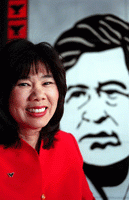Lorraine Lee

Lorraine Lee is among the most notable voices and respected activists in Tucson's Latino community. Her father of Chinese/Japanese descent immigrated from the Philippines to the United States and her mother of Chinese/Mexican descent emigrated from Mexico. Lee knows the pain of discrimination firsthand through the stories of her family. Her own experiences as a native Tucsonan growing up on the city's southside both witnessing and enduring the evils of racism set the foundation for her deep commitment to working to be a catalyst for social justice in the community. An active member of the Chicano Movement in her youth Lee recalls participating in marches and protests through the streets of South Tucson bringing attention to the issues affecting the Latino community and the exhilaration that she felt as part of El Moviemento. She deems César Chávez as one of the main influences of her work citing his vision of creating an inclusive movement that sought to advocate for all workers regardless of their ethnicity. While attending the University of Arizona where she earned her B.A. Degree in Psychology in 1978 she met her husband Alonzo Morado through their involvement in M.E.Ch.A (Moviemento Estudiantil Chicano de Aztlán, an activist group established by the Chicano Movement to seek empowerment through education and political action). During her undergraduate years she was also an enthusiastic foosball player who dominated the foosball scene at Louie's Lower Level in the UA's Student Union. Lee went on to UCLA to do her post-graduate work and promptly returned to Tucson after the completion of her M.A. Degree in Urban Planning. In 1982 she began her work with Chicanos Por La Causa Inc. (CPLC) "a nationally recognized Community Development Corporation dedicated to the promotion of self-sufficiency and a greater quality of life for members of the community". CPLC Tucson currently operates a wide range of social cultural and economic development programs with the goal of providing greater opportunity and dignity. Lee serves as the Executive Vice President for CPLC the highest position in the organization's Tucson office. When asked if she would consider leaving Tucson in order to serve in a higher position within CPLC Lee instantly replies "No! Tucson is my home. Every day that I was gone while attending UCLA I wished I was in Tucson and I'm not ever leaving again". During her tenure as Executive Vice President she has overseen the establishment of several of CPLC's programs including: an award-winning Affordable Housing Construction Company; the establishment of three Charter High Schools that provide a unique and empowering educational experience to youth; and her personal favorite Corazon de Aztlán a Youth Leadership Development Program. The implementation of these programs demonstrates that Lee is truly the champion of the poor and disenfranchised in Tucson. Lee is an esteemed leader known for her ability to create coalitions and for her formidable influence in labor and political circles. She is active in both Tucson's Latino and Asian communities. Recognized for her impeccable integrity and compassion her work is a testament to the change that can be created through the perseverance of one person. She has received several awards for her work both locally and nationally. Among her awards are: National Council of La Raza Maclovio Barraza Leadership Award and The Pan Asian Community Alliance "Woman of the Year" 2001. She was honored by Congressman Ed Pastor before the U.S. House of Representatives for her many contributions to the Tucson community. The impact of her life's work as a community activist and with CPLC reaches far beyond the boundaries of the Tucson community. Lee's strength and dedication are responsible for shattering barriers and the creating of opportunities for individuals and families whose voices are often stifled. As the mother of two daughters Lee often cites her children as one of the strongest motivating forces of her work. "I'm trying to make the world a better place for my kids". Humbly she refers to herself as "one voice". The power of her voice is far-reaching and its reverberations will continue to promote justice far beyond the boundaries of the Old Pueblo. Written by: Celina Valencia


